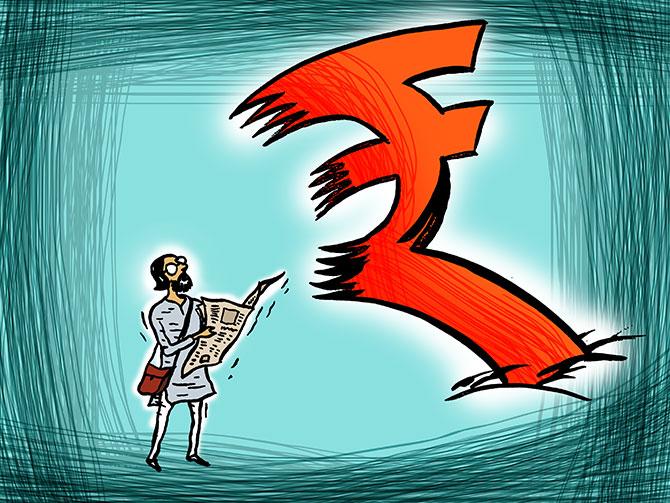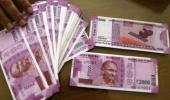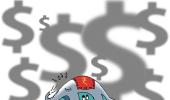'When the rupee was at 65 a dollar, we wanted to go to Thailand for a holiday.'
'Now at 72, we may find Goa much more attractive.'
'That's how correction happens.'
'If you don't let that correction happen, then it's a pressure cooker that bursts one day.'
Illustration: Dominic Xavier/Rediff.com

"It is often normal for a currency to depreciate 20 per cent in a year," Hitendra Dave, head of global banking, HSBC India, tells Nikhat Hetavkar and Anup Roy.
Why are bond yields rising? Is it because of the rupee or because of the supply?
It's a mixture of both. Growth is not very strong and supply between the Centre and states is quite large.
The bond supply used to get soaked through the statutory liquidity ratio or SLR requirement of banks. Now, banks have excess SLR.
A large part of the banking system has suffered mark-to-market losses. So, the appetite is also very low.
Many saying the rupee fall will force the Reserve Bank of India to hike rates.
We don't know if an inflation-targeting central bank would go back to the past and do what it used to do before the inflation mandate.
Isn't a rate hike necessary to fight import-led inflation?
It is a correction that is happening in the rupee. The currency weakness is because of the excess imports compared to exports. It is good.
One thought is that a hike would increase the rate differential to encourage portfolio flows.
Whoever has come out with the argument has not bought one rupee of bond in his life!
I don't really think rising interest rates would attract money. If it did, Argentina with 60 per cent and Turkey at 25 per cent would have got all the world's money.
Interest rate is a blunt instrument. It affects everybody in the economy.
Imports are just 10 per cent of GDP (gross domestic product). Why would you impact 90 per cent to correct 10 per cent?
So you support the rupee slide?
It is a self-correcting mechanism.
When the rupee was at 65 a dollar, we wanted to go to Thailand for a holiday. Now at 72, we may find Goa much more attractive.
That's how correction happens. If you don't let that correction happen, then it's a pressure cooker that bursts one day.
Think about exporters too. They are getting better returns on their bills. I am strongly in the camp that this is a good change.
The only people who have been often affected are people with unhedged foreign currency exposure.
They are big companies and the common man doesn't get affected much. They adjust by rationalising their extra consumption.
There is talk that the RBI and the government may bring 2013-like dollar deposit schemes or dollar bond issues.
Frankly, I don't think that is necessary. The rupee's correction is good and they should let it happen. It is more or less done now.
The RBI is not intervening much. It seems to be fixated on the $400 billion forex reserves number.
It is doing the right thing. If the rupee is at 73, it is very attractive for an American investor.
Why are they not thinking it is a great time to buy Indian stocks now?
It is often normal for a currency to depreciate 20 per cent in a year.
When the rupee had a sharp depreciation in 2013, we also witnessed a sharp contraction in the current account deficit.












 © 2025
© 2025